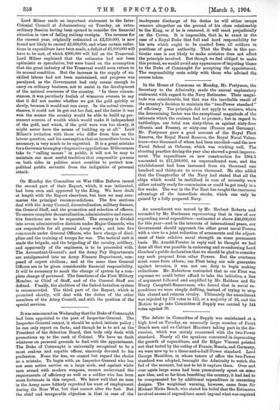In the House of Commons on Monday, Mr. Pretyman, the
Secretary to the Admiralty, made the annual explanatory statement with regard to the Navy Estimates. Their magni- tude was considerable, but that was the inevitable result of the country's decision to maintain the "two-Power standard" of efficiency. The principle did not apply to eruisers, where the determining factor was the exceptional magnitude of the interests which the cruisers had to protect; but in regard to battleships, our total was sixty-three, as against sixty-four (Russia and France), or sixty-one (France and Germany). Mr. Pretyman gave a good account of the Royal Fleet Reserve, the Royal Naval Reserve, the Royal Naval Volun- teers—two thousand of whom had been enrolled—and the new Naval School at Osborne, which was working well. The shooting practice during the year also showed a great improve- ment. The expenditure on new construction for 1904-5 amounted to £11,500,000, an unprecedented sum, and the establishment had been increased from six thousand one hundred and thirty-six to seven thousand. He also added that the Comptroller of the Navy had stated that all the ships which would be mobilised in ease of necessity were either actually ready for commission or could be got ready in a few weeks. The war in the Far East has taught the enormous advantage of the immediate stroke, which can only be gained by a fully prepared Navy.










































 Previous page
Previous page